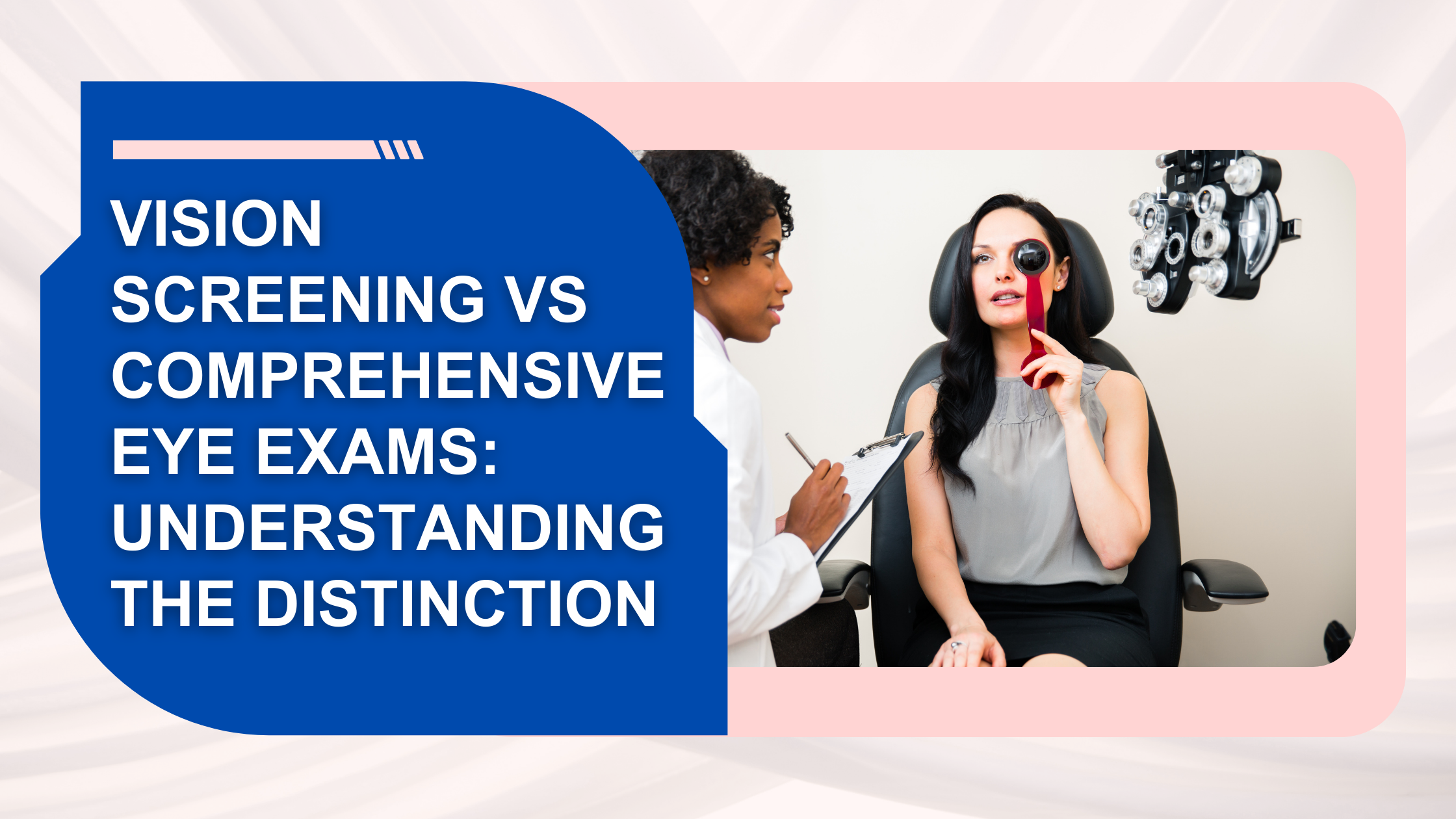Vision plays a pivotal role in our daily activities, from reading and driving to enjoying the beauty of the world around us. But with the passing of time and effects of an unhealthy lifestyle, we often experience visual discomfort. To ensure that our eyes remain in optimal condition, it’s crucial to understand the key differences between vision screenings and comprehensive eye exams. In this blog, we will delve into the distinct purposes, procedures, and benefits of these two approaches to eye care.
Vision Screening: A Quick Overview
Vision screenings are typically the most common type of eye evaluation and are often conducted in schools, workplaces, and during routine healthcare check-ups. These screenings serve as a basic assessment of your vision, aiming to identify any potential issues that require further examination.
Purpose of Vision Screenings
Vision screenings are primarily designed to identify obvious visual problems and are not meant to replace comprehensive eye examinations. Their key purposes include:
Early Detection: Vision screenings are valuable for detecting glaring vision problems in children and adults early, which can then prompt referrals for comprehensive eye exams.
Basic Assessment: They provide a quick and straightforward assessment of visual acuity (how well you can see at a distance) and may include simple tests like reading an eye chart.
Procedure
Vision screenings typically involve the following steps:
Visual Acuity Test: The most common test, where you read letters or symbols from a chart at a specific distance.
Eye Cover Test: Used to detect strabismus (misalignment of the eyes).
Color Blindness Test: Usually using Ishihara plates to detect colour vision deficiencies.
Autorefraction: An automated test to estimate your prescription.
Pupil Reactions: Assessing how your pupils respond to light.
Benefits of Vision Screenings
Vision screenings serve several essential purposes:
Early Intervention: They help identify individuals who may need further evaluation, leading to early intervention if necessary.
Accessibility: Screenings are readily available and often conducted in schools and workplaces.
Cost-Effective: They are a cost-effective way to identify potential vision issues.
If you suffer from any kind of visual discomfort, you should go for an immediate vision screening test. Salisbury Optometrist is one of the leading eye care where you can find the best eye specialists to check your eyes.
Comprehensive Eye Exams: A Thorough Assessment
In contrast to vision screenings, comprehensive eye examinations are a more in-depth evaluation of your eye health and vision. They are typically performed by optometrists or ophthalmologists and should be conducted regularly, even if you have no apparent vision problems.
Purpose of Comprehensive Eye Exams
Comprehensive eye exams serve a broad range of purposes, including:
Detecting Eye Diseases: They can identify a wide range of eye conditions, such as glaucoma, cataracts, and macular degeneration.
Prescription Updates: Regular exams ensure your eyeglass or contact lens prescription is up to date.
Assessing Eye Health: They provide a thorough evaluation of the overall health of your eyes, not just your visual acuity.
Monitoring Eye Health: For those with existing eye conditions, regular exams are essential for monitoring changes and adjusting treatment plans.
Procedure
Comprehensive eye exams are more extensive and involve:
Case History: The eye care professional gathers information about your medical history and any current eye concerns.
Visual Acuity Testing: Similar to screenings, but often performed with more precision.
Refraction: Determining the best prescription for eyeglasses or contact lenses.
Eye Health Evaluation: This includes examining the front and back of the eye, measuring eye pressure, and assessing the retina.
Additional Testing: Depending on your age and risk factors, other tests like visual field testing or retinal imaging may be conducted.
Benefits of Comprehensive Eye Exams
The advantages of comprehensive eye exams are extensive:
Early Disease Detection: They can identify eye diseases in their early stages when treatment is most effective.
Precise Prescription: Ensure your eyeglass or contact lens prescription is optimised for your vision.
Holistic Assessment: Comprehensive exams evaluate overall eye health, not just vision.
Individualised Care: Tailored recommendations for eye care and maintenance.
Suppose you have a family history of eye-related problems. In that case, you must go for an eye examination appointment and get your eyes appropriately checked to find any potential problem early.
Wrapping It Up
Vision screenings and comprehensive eye exams serve different but complementary purposes. Vision screenings are a quick and accessible way to identify potential vision issues, while comprehensive eye exams provide a thorough assessment of eye health and visual acuity. To maintain good eye health, it’s essential to understand when each type of evaluation is necessary and to follow the recommendations of eye care professionals.

